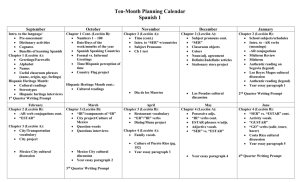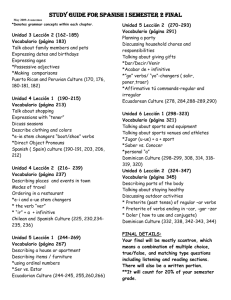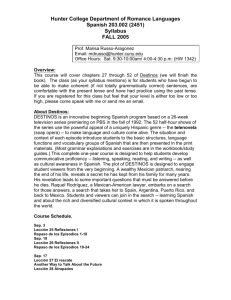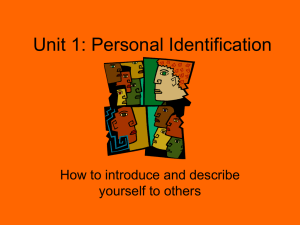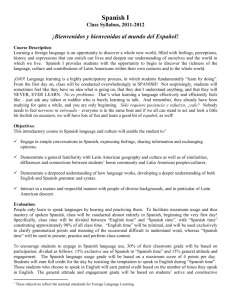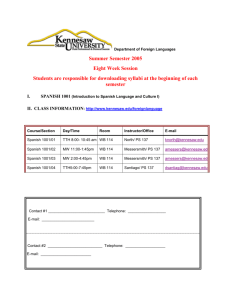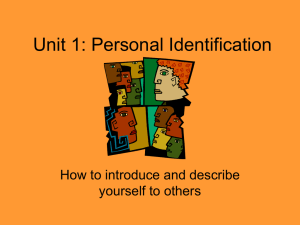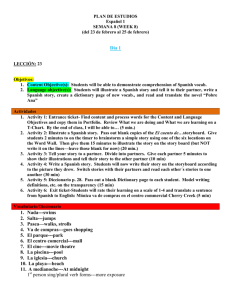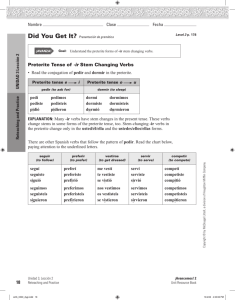1 MODERN LANGUAGES AND LITERATURES THE UNIVERSITY
advertisement
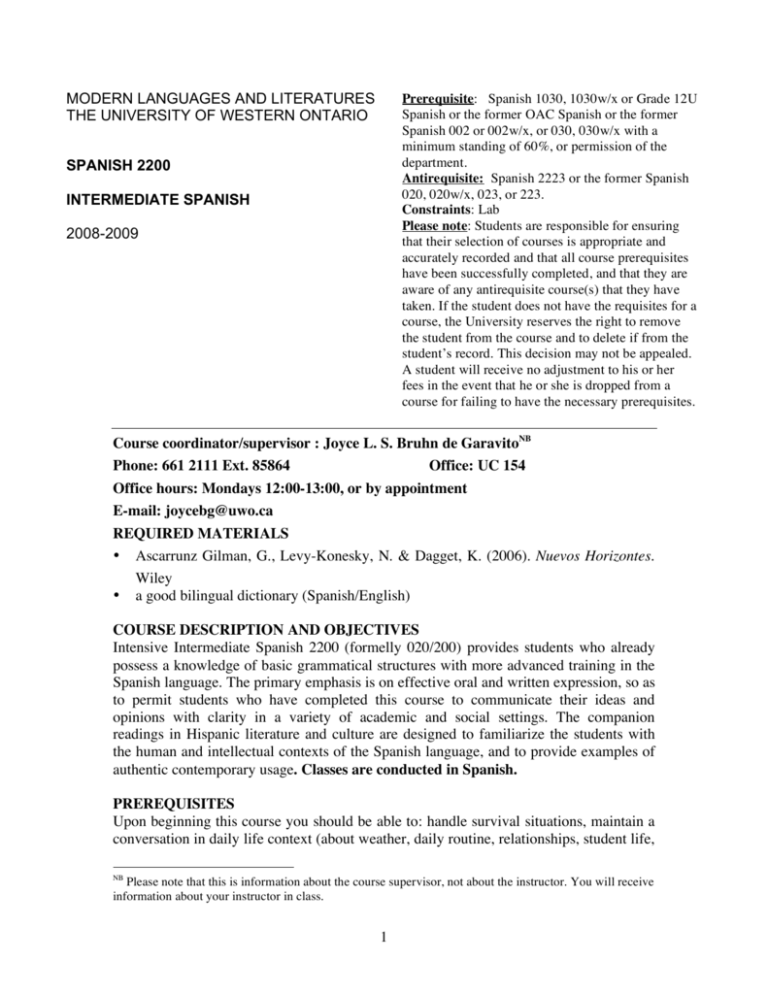
MODERN LANGUAGES AND LITERATURES THE UNIVERSITY OF WESTERN ONTARIO Prerequisite: Spanish 1030, 1030w/x or Grade 12U Spanish or the former OAC Spanish or the former Spanish 002 or 002w/x, or 030, 030w/x with a minimum standing of 60%, or permission of the department. Antirequisite: Spanish 2223 or the former Spanish 020, 020w/x, 023, or 223. Constraints: Lab Please note: Students are responsible for ensuring that their selection of courses is appropriate and accurately recorded and that all course prerequisites have been successfully completed, and that they are aware of any antirequisite course(s) that they have taken. If the student does not have the requisites for a course, the University reserves the right to remove the student from the course and to delete if from the student’s record. This decision may not be appealed. A student will receive no adjustment to his or her fees in the event that he or she is dropped from a course for failing to have the necessary prerequisites. SPANISH 2200 INTERMEDIATE SPANISH 2008-2009 Course coordinator/supervisor : Joyce L. S. Bruhn de GaravitoNB Phone: 661 2111 Ext. 85864 Office: UC 154 Office hours: Mondays 12:00-13:00, or by appointment E-mail: joycebg@uwo.ca REQUIRED MATERIALS • Ascarrunz Gilman, G., Levy-Konesky, N. & Dagget, K. (2006). Nuevos Horizontes. Wiley • a good bilingual dictionary (Spanish/English) COURSE DESCRIPTION AND OBJECTIVES Intensive Intermediate Spanish 2200 (formelly 020/200) provides students who already possess a knowledge of basic grammatical structures with more advanced training in the Spanish language. The primary emphasis is on effective oral and written expression, so as to permit students who have completed this course to communicate their ideas and opinions with clarity in a variety of academic and social settings. The companion readings in Hispanic literature and culture are designed to familiarize the students with the human and intellectual contexts of the Spanish language, and to provide examples of authentic contemporary usage. Classes are conducted in Spanish. PREREQUISITES Upon beginning this course you should be able to: handle survival situations, maintain a conversation in daily life context (about weather, daily routine, relationships, student life, NB Please note that this is information about the course supervisor, not about the instructor. You will receive information about your instructor in class. 1 news, etc.), relate past experiences, give and ask for information, express feelings and opinions, describe a person, a thing or an event in the present and the past. You should also have some idea about Hispanic culture. LEARNING OUTCOMES Upon completing this course you should be able to: Oral Comprehension: • understand the main ideas of connected discourse on a variety of topics beyond the immediacy of the situation Oral Production: • express yourself clearly and fluently using comprehensible pronunciation and intonation patterns • express likes and dislikes, describe people and places, narrate and describe in the past, express wishes and desires, talk about unrealized and anticipated actions and states, give directions, make suggestions, requests and hypotheses • report speech, express and defend opinions and ideas Reading Comprehension • understand authentic documents such as cultural texts, newspaper articles and fiction. Written Expression • produce two-page descriptive, narrative and argumentative pieces of writing • generate coherent form and content • compose complex sentences using proper logical connectors and relative pronouns. Grammar • control the verb and pronoun systems • follow the sequence of tenses • master the rules of gender, number and agreement Vocabulary • effectively use a more precise and varied vocabulary to communicate fine shades of meaning and details • expand your passive vocabulary Culture • express yourself according to social circumstances • develop awareness of similarities and differences between your culture and those of Hispanic origin • develop an understanding and appreciation of the wealth of social, intellectual, artistic, historical and political values and manifestations of Hispanic Culture • appreciate and analyze samples of Hispanic literature 2 IN CLASS ACTIVITIES • • • • • • • Conversation and practice in class and in the conversation lab Free and guided discussions Grammar reviewing and grammar practice Vocabulary enrichment Individual and group work Oral presentations Obtaining information from the Web REQUIRED WORK AT HOME This course requires a minimum of one hour homework for every class hour. • • • • • • • • • Computer work (WebCT including Wimba, and other) Daily homework (grammar, vocabulary and short composition assignments) Review of the grammar explanations in the textbook before coming to class Read assigned texts and prepare comprehension exercises before coming to class Compositions (4, drafts and final copies, between 400 and 500 words) Preparation for in class tests (4) and final exam Continuous reinforcement of new vocabulary and structure Awareness of mistakes and initiation for self-correction in oral and written production Research and documentation on cultural topics CLASS MANAGEMENT • Students are expected to come to class regularly and attendance will be strictly monitored. • Because attendance is so important in language courses, any student who, in the opinion of the course coordinator, is absent too frequently from class or laboratory periods in any course, will be reported to the Dean (after due warning has been given). On the recommendation of the Department concerned, and with the permission of the Dean, the student will be debarred from taking the regular examination in the course (see UWO Academic Calendar). • Absenteeism: Students seeking academic accommodation on medical grounds for any missed tests, exams, participation components and/or assignments must apply to the Academic Counselling office of their home Faculty and provide documentation. Academic accommodation cannot be granted by the instructor or department. 3 • UWO's Policy on Accommodation for Medical Illness: (https://studentservices.uwo.ca/secure/index.cfm) • Downloadable Student Medical Certificate (SMC): https://studentservices.uwo.ca under the Medical Documentation heading • Work (homework, quizzes, compositions, oral presentations) should be done on time. No late assignments are allowed unless a valid reason is provided. • It is important to prepare readings before coming to class because there will be activities and discussions based on them. There will also be a quiz on each reading. • Students must write two versions for each composition. Your instructor will correct the first draft following a correction grid which students will receive. There will be suggestions on how to improve the content, the organization and the grammar. The student should re-write the composition implementing the suggested changes and hand in both versions, the original and the corrected. If you fail to hand in the corrected copy you may lose 20% of your mark. • The Lab hour will consist of a variety of activities leading to oral proficiency and increased vocabulary, including visits to Spanish sites, movies, and conversation. • Oral assignments will use the Wimba component of WebCT. • On WebCT you will find copies of the PowerPoints used in class, important dates, correction of the tests, etc. You will also be able to complete oral assignments given to you by your instructor using a subsystem of WebCT referred to as Wimba. The address for WebCT is http://webct.uwo.ca/. In order to access WebCT you must have a UWO account. To log on the system will ask you to give your account name and your secret password. • Testing and exams: There are four in-class tests in the course of the year, plus a final exam. The grade of the best three in-class tests will count towards the final mark. However, students must attend all evaluations unless exceptional circumstances exist (medical reasons only). If a problem arises, students are expected to contact their instructor before the exam or assignment is due. (Students who miss a test or in-class composition without a valid reason will receive a 0 which will count towards the final grade.). There will be no make-up tests in this course. • Cheating. It is the obligation of all students to inform themselves of the University's regulations on plagiarism and academic honesty. Students are expressly forbidden to have their compositions corrected by native speakers or any other person. If an instructor believes that a composition is not entirely the work of the student who has submitted it, the instructor may request that the 4 student rewrite the composition in his/her presence. If the composition is unmistakably the work of another person, or if the student is suspected of any type of plagiarism or cheating, the student will be reported to the Undergraduate Chair of the department, who will determine the penalty. Plagiarism: Plagiarism is a major academic offense (see Scholastic Offense Policy in the Western Academic Calendar). Plagiarism is the inclusion of someone else's verbatim or paraphrased text in one's own written work without immediate reference. Verbatim text must be surrounded by quotation marks or indented if it is longer than four lines. A reference must follow right after borrowed material (usually the author's name and page number). Without immediate reference to borrowed material, a list of sources at the end of a written assignment does not protect a writer against the possible charge of plagiarism. The University of Western Ontario uses a plagiarism-checking site called Turnitin.com. EVALUATION F. Evaluation Labs (participation, preparation, etc.) Assignments (oral and written), participation, etc. Quizzes (around 5) 3 (out of 4) tests (grammar, oral comprehension and compositions 2 oral presentations 4 compositions (home ) Final exam 5 10% 8% 5% 30% 5% 12% 30% Total 100% PLAN DE CURSO∗ Septiembre LUNES/MARTES MIERCOLES/JUEVES 4 Presentación del sílabo 8/9 A conocernos Repaso 15/16 Lección 1 10/11 Lección 1 22/23 Lección 1 24/25 Lectura: Las vecinas 17/18 Lección 1 29/30 Lección 2 Octubre LUNES/MARTES 6/7 Lección 2 MIERCOLES/JUEVES 1/2 Lección 2 Composición en casa 1 8/9 Lección 2 13/14 Acción de gracias 15/16 Lección 2 20/21 Lectura: Yo y el ladrón 22/23 Examen 1 27/28 Lección 3 29/30 Lección 3 Noviembre LUNES/MARTES 3/4 Lección 3 Composición en casa 2 10/11 Lección 3 MIERCOLES/JUEVES 5/6 Lección 3 17/18 Examen 2 19/20 Lección 4 24/25 Lección 4 26/27 Lección 4 12/13 Lectura: La camisa de Margarita Diciembre LUNES/MARTES 1/2 Presentaciones orales ∗ MIERCOLES/JUEVES 3 Lección 4 This course outline may change. 6 Enero LUNES/MARTES 5/6 Lección 4 MIERCOLES/JUEVES 7/8 Lección 5 12/13 Lección 5 14/15 Lección 5 19/20 Lección 5 21/22 Lección 5 26/27 Lección 5 28/29 Lectura: Cajas de cartón Febrero LUNES/MARTES 2/3 Examen 3 MIERCOLES/JUEVES 4/5 Lección 6 9/10 Lección 6 11/12 Lección 6 16/17 Libre 18/19 Libre 23/24 Lección 6 25/26 Lección 6 Composición en casa 3 Marzo LUNES/MARTES 2/3 Lección 6 MIERCOLES/JUEVES 4/5 Lectura: El vaso de leche 9/10 Examen 4 11/12 Lección 7 16/17 Lección 7 18/19 Lección 7 23/24 Lección 7 Composición en casa 4 30/31 Lección 7 25/26 Lección 7 Abril LUNES/MARTES 1/2 Lectura: Jaque Mate en dos Jugadas MIERCOLES/JUEVES 3/4 Presentaciones orales 2 6/7 Repaso 8 Repaso 7
